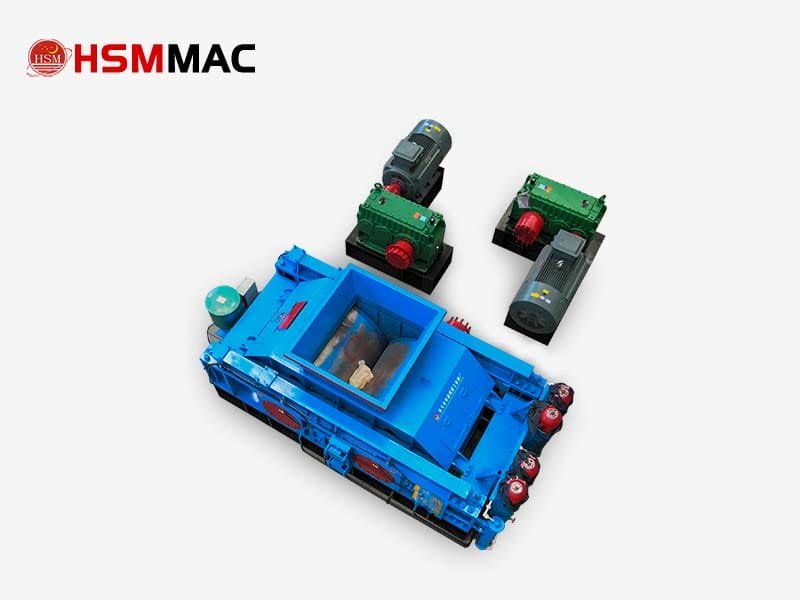In the field of stone crushing, the double-roll crusher (double-tooth roll crusher) has become the preferred equipment for processing medium to low hardness stones (such as limestone, shale, coal gangue, etc.) due to its unique design and operating principle. The following is a comprehensive analysis of its core advantages and applicable scenarios:

double-roll crusher
1. Precise particle size control, enhancing aggregate quality
Hydraulic/mechanical particle size adjustment
By adjusting the distance between the two rollers (typically 30–200 mm), the output particle size (e.g., 10–50 mm) can be precisely controlled to meet construction aggregate grading requirements, reducing over-crushing (over-crushing rate reduced by over 30%)
High uniformity of particle shape
The compression-shearing crushing principle results in cubic-shaped particles (cubic content >80%), enhancing the compressive strength of recycled aggregates and reducing subsequent screening costs.
2. Energy-efficient and cost-effective, reducing operational costs
Significant energy-saving advantages
Low-speed, high-torque design achieves energy consumption of just 0.5-0.8 kWh/tonne, saving 30%-50% compared to impact crushers.
Continuous production capacity
Single-unit processing capacity of 50–500 tonnes per hour, suitable for large-scale production lines, reducing downtime
Low maintenance costs
Modular wear-resistant rollers (high-chromium alloy material) with a lifespan exceeding 8,000 hours, easy to replace, and maintenance costs 30% lower than jaw crushers
3. Reliable structure, suitable for complex operating conditions
Overload protection and intelligent control
The hydraulic system automatically retracts upon encountering hard objects to prevent equipment damage; the intelligent control system adjusts parameters in real-time to ensure stable operation
Wet and sticky material processing capability
The shear force design can peel off adhered materials, supporting the crushing of wet materials with moisture content ≤15% (traditional jaw crushers are prone to blockages)
Impurity separation function
Rotating tooth rollers separate impurities such as wood and light metals, enhancing aggregate purity
4. Environmentally compliant, green production
Low dust and low noise
Closed structure + dust-proof panels reduce dust emissions by 60%, with noise levels below 85 dB, meeting environmental standards
Resource recycling
Crushing construction waste (concrete, bricks, tiles) to produce recycled aggregate with a utilisation rate ≥90%, reducing landfill space and carbon emissions
5. Outstanding economic benefits
| Indicators | Double roller crusher | Traditional crushing equipment |
| Energy consumption costs | 0.5-0.8 yuan/tonne1.0-1.5 yuan/tonne | 1.0-1.5 yuan/tonne |
| Maintenance costs | Low (wear-resistant teeth roller) | High (frequent jaw plate replacement) |
| Return on investment cycle | 2-3 years | 4-5 years |
6. Application Scenarios and Selection Recommendations
Ideal Application Scenarios
Medium to low hardness rock materials: limestone, shale, coal gangue aggregate production (compressive strength ≤ 70 MPa)
Construction waste recycling: concrete blocks, brick and tile crushing to produce roadbed fill material (particle size 0–50 mm)
Industrial solid waste treatment: cement kiln waste, slag resource utilisation
Avoidance Scenarios
High-hardness rocks (granite, basalt > 150 MPa) require the ‘jaw crusher + cone crusher’ combination
Selection Parameters
Production capacity matching: Small to medium-sized projects select 50–200 t/h (e.g., 2PGC600×750), large-scale projects select 200–500 t/h
Mobility Requirements: Track-mounted units are preferred for complex terrain in mining areas, with relocation time ≤ 2 hours
Summary
Double-roll crushers, with their precise particle size control, energy efficiency, high adaptability, and environmental advantages, have become the gold standard equipment for crushing medium to low hardness rock materials. Their economic efficiency (long-term cost reduction of 30%-50%) and resource recycling value make them more competitive under green mining and ‘waste-free city’ policies. When selecting equipment, it is essential to strictly match the hardness of the stone material, production capacity, and environmental requirements, and to prioritise brands with wear-resistant technology (such as high-chromium alloy roll liners) and rapid service capabilities (such as Huashengming).
























